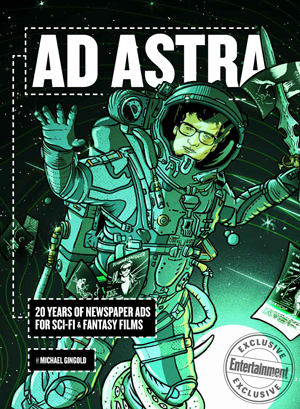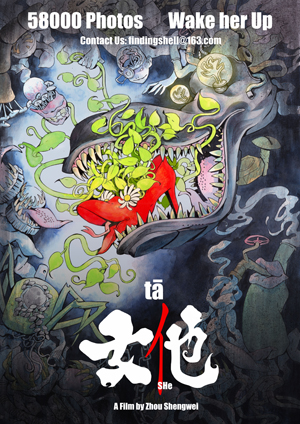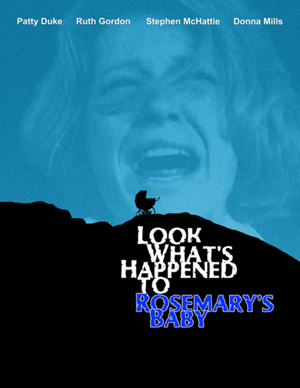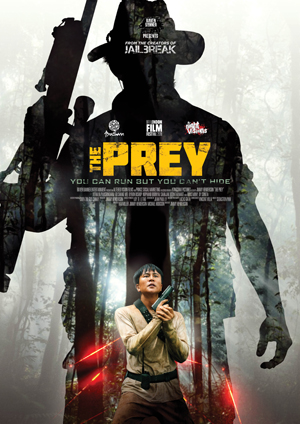Fantasia 2019, Day 9, Part 2: J.R. “Bob” Dobbs and the Church of the Subgenius
 My second and last movie on July 19 was a documentary named for its subject: J.R. “Bob” Dobbs and the Church of the Subgenius (a film known in some quarters as Slacking Towards Bethlehem). Directed by Sandy K. Boone, it’s a history of a mock religion which got started more than 40 years ago, and still goes strong today.
My second and last movie on July 19 was a documentary named for its subject: J.R. “Bob” Dobbs and the Church of the Subgenius (a film known in some quarters as Slacking Towards Bethlehem). Directed by Sandy K. Boone, it’s a history of a mock religion which got started more than 40 years ago, and still goes strong today.
It was begun by two bright misfit young men in the late 1970s, when Douglas Smith AKA Ivan Stang and Steve Wilcox AKA Philo Drummond took on aliases and began writing satirical pamphlets outlining the gospel and worldview of the Church of the Subgenius. They swiftly developed a specific tone and weird doctrine, praising the figure of J.R. “Bob” Dobbs, a piece of 1950s advertising clip art. “Bob” (there must always be quotation marks around his name) represented a quality called ‘slack,’ which was never really defined except that it was a good thing to have; organised religions, by contrast, did not have slack. At any rate, the Church of the Subgenius developed a complex set of myths around gods, mutants, and aliens, and began selling their pamphlets through the mail. They came along at the right time to take advantage of zine culture as it developed through the 80s, and more and more people wrote away for their strange handmade tracts sending up the whole idea of mythology and religion. Live events followed, including annual “devivals” at which the end of the world is expected and awaited with joy. All the while the Church maintained its basic parodic aim and attitude, and, still in existence, keeps up that attitude in the face of an increasingly bizarre reality.
The movie tells us the story of the Church through a basically chronological structure. There are extensive interviews with Church members, especially the two founders. Ivan Stang is the more voluble, slightly manic with an odd edge, a recurring figure through the documentary that anchors the film. There are also interviews with well-known members of the Church, like Paul Mavrides, Alex Cox, Richard Linklater, and Penn Jillette. And there is a lot of archival footage, some of it taken by members of the Church and some of it footage from TV news shows showing baffled reporters trying to cover a Church event.
There’s a certain amount of care taken to explain to the wired world the zine subculture of the 1980s. The Church of the Subgenius took off in that context, reaching people who risked sending a dollar to a perfect stranger to get something weird in exchange. In the days before the internet, zines were a way for largely-bright and largely-young people to connect with each other, with the Church perhaps one of the odder examples of this alternative culture. Time having passed, it has also proved one of the longer-lasting.
 On the evening of July 19 I sat down in the Hall Theatre for a screening of It Comes (Kuru, 来る), a Japanese horror film. Directed by Tetsuya Nakashima, it’s based on the novel Bogiwan ga kuru, by Ichi Sawamura, with a screenplay by Nakashima, Hideto Iwai, and Nobuhiro Monma. It’s clever and colourful, and at two and a half hours it’s also a sprawling film that justifies its length by twisting in ways you don’t expect. It’s also a success, an entertaining and occasionally chilling movie that builds a universe without being too detailed about the supernatural horror lurking beyond consensus reality.
On the evening of July 19 I sat down in the Hall Theatre for a screening of It Comes (Kuru, 来る), a Japanese horror film. Directed by Tetsuya Nakashima, it’s based on the novel Bogiwan ga kuru, by Ichi Sawamura, with a screenplay by Nakashima, Hideto Iwai, and Nobuhiro Monma. It’s clever and colourful, and at two and a half hours it’s also a sprawling film that justifies its length by twisting in ways you don’t expect. It’s also a success, an entertaining and occasionally chilling movie that builds a universe without being too detailed about the supernatural horror lurking beyond consensus reality. My last film of July 18 was in the big Hall Theatre. Knives and Skin was written and directed by Jennifer Reeder, and begins as a girl dies a violent death in a small midwestern town. In the wake of her disappearance secrets begin to come to light, and tensions rise among both her classmates and the adults. The movie proceeds to explore the town and its inhabitants in a series of sometimes-linked vignettes.
My last film of July 18 was in the big Hall Theatre. Knives and Skin was written and directed by Jennifer Reeder, and begins as a girl dies a violent death in a small midwestern town. In the wake of her disappearance secrets begin to come to light, and tensions rise among both her classmates and the adults. The movie proceeds to explore the town and its inhabitants in a series of sometimes-linked vignettes. Before my second film of July 18, a surreal science-fiction movie from the director of
Before my second film of July 18, a surreal science-fiction movie from the director of  I expected my last film of July 16 would be a documentary called Blood & Flesh – The Reel Life and Ghastly Death of Al Adamson. You may not have heard of Adamson. I hadn’t. He was an exploitation filmmaker in the 1960s and 70s, responsible for titles like Satan’s Sadists, The Naughty Stewardesses, and Dracula Vs. Frankenstein, as well as not one but two separate films titled Psycho a Go-Go (Technically, one was Psycho à Go-Go; note accent). Introducing the documentary, Fantasia co-Director Mitch Davis described Adamson as more of a hustler than a filmmaker, then called up director David Gregory to briefly explain the film’s genesis. Gregory said it began as a special feature for a Blu-ray release, but the more he investigated Adamson, the more he realised the material was worth digging into more deeply. Thus, it’s now a feature, covering Adamson’s life, the films he made, and his awful death.
I expected my last film of July 16 would be a documentary called Blood & Flesh – The Reel Life and Ghastly Death of Al Adamson. You may not have heard of Adamson. I hadn’t. He was an exploitation filmmaker in the 1960s and 70s, responsible for titles like Satan’s Sadists, The Naughty Stewardesses, and Dracula Vs. Frankenstein, as well as not one but two separate films titled Psycho a Go-Go (Technically, one was Psycho à Go-Go; note accent). Introducing the documentary, Fantasia co-Director Mitch Davis described Adamson as more of a hustler than a filmmaker, then called up director David Gregory to briefly explain the film’s genesis. Gregory said it began as a special feature for a Blu-ray release, but the more he investigated Adamson, the more he realised the material was worth digging into more deeply. Thus, it’s now a feature, covering Adamson’s life, the films he made, and his awful death. On July 16 I started my day at Fantasia with a book launch. Michael Gingold’s book Ad Astra is coming out this fall, but attendees of his multimedia presentation had the chance to buy it earlier. It’s a follow-up to 2018’s Ad Nauseam: Newsprint Nightmares From the 1980s and its sequel to come in September, Ad Nauseam II: Newsprint Nightmares From the 1990s and 2000s. Those books were collections of classic newspaper ads for horror movies, while Ad Astra is subtitled 20 Years of Newspaper Ads for Sci-Fi & Fantasy Films.
On July 16 I started my day at Fantasia with a book launch. Michael Gingold’s book Ad Astra is coming out this fall, but attendees of his multimedia presentation had the chance to buy it earlier. It’s a follow-up to 2018’s Ad Nauseam: Newsprint Nightmares From the 1980s and its sequel to come in September, Ad Nauseam II: Newsprint Nightmares From the 1990s and 2000s. Those books were collections of classic newspaper ads for horror movies, while Ad Astra is subtitled 20 Years of Newspaper Ads for Sci-Fi & Fantasy Films. The fourth and last movie I saw on July 16 was the most experimental movie I’d seen at Fantasia, not only this year but possibly in all the time I’ve been going to the festival. Before that feature, though, was a short almost as strange.
The fourth and last movie I saw on July 16 was the most experimental movie I’d seen at Fantasia, not only this year but possibly in all the time I’ve been going to the festival. Before that feature, though, was a short almost as strange.
 It’s relatively unusual for me to watch a movie that I know going in is not good. But every so often, and usually at Fantasia, something bizarre comes along that looks bad but also in its way promising. So it was that for my third film of July 16 I settled in at the De Sève Theatre for a screening of the rare 1976 TV-movie sequel to Rosemary’s Baby: an opus directed by Sam O’Steen titled Look What’s Happened to Rosemary’s Baby. Star Stephen McHattie was in attendance, and would stick around to take our questions after the film.
It’s relatively unusual for me to watch a movie that I know going in is not good. But every so often, and usually at Fantasia, something bizarre comes along that looks bad but also in its way promising. So it was that for my third film of July 16 I settled in at the De Sève Theatre for a screening of the rare 1976 TV-movie sequel to Rosemary’s Baby: an opus directed by Sam O’Steen titled Look What’s Happened to Rosemary’s Baby. Star Stephen McHattie was in attendance, and would stick around to take our questions after the film. For my second movie of July 15 I went to the Fantasia screening room to watch the Cambodian film The Prey. Directed by Jimmy Henderson from a script by Henderson with Michael Hodgson and Kai Miller, this is a film that traces its narrative lineage back to Richard Connell’s immortal “The Most Dangerous Game.” In this case, the game’s played in the wilds of Cambodia, and the rules turn out to be surprisingly complex — and the number of players surprisingly large.
For my second movie of July 15 I went to the Fantasia screening room to watch the Cambodian film The Prey. Directed by Jimmy Henderson from a script by Henderson with Michael Hodgson and Kai Miller, this is a film that traces its narrative lineage back to Richard Connell’s immortal “The Most Dangerous Game.” In this case, the game’s played in the wilds of Cambodia, and the rules turn out to be surprisingly complex — and the number of players surprisingly large.